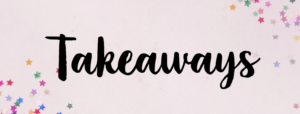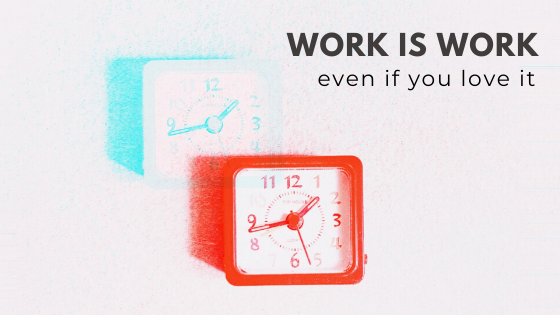The adage “love the work you do and you’ll never work a day in your life” is problematic…and pervasive.
Today’s blog post complicates the idea that work we love is somehow not labor and I model some intentional steps you can take to reconsider your own approach to your work as work.
I was commuting home last week, an hour into an audiobook about business, having just spent the previous hour in therapy processing my emotions about accessibility in the coaching field, and I kept pausing the audiobook to have quiet thoughts about business and record voice memos to remind me to do X, Y, and Z tomorrow at 9 a.m.. I noticed it was 6 p.m., a time I had predetermined as outside my working hours, and here I was: working.
Except it didn’t feel like work. I was listening to a fun book! I was laughing, reflecting, daydreaming, planning, considering. I knew that I had some great OnBeing podcasts and some energizing classical music I could listen to, but I was drawn to the business book. When I had my “holy shit” awareness moment and acknowledged that I was working without realizing it, I felt anxious and worried.
I’m a self-identified recovering workaholic, and part of my productivity journey has been learning how to recognize when I’m sneaking back to the siren song of non-stop work. The most dangerous way I do this is by confusing work tasks with downtime. It’s a messy topic that Marlee Grace writes about at length in her book How to Not Always Be Working: A Toolkit for Creativity and Radical Self-Care, and something I’ve covered before in my multiple posts on workaholism, which I’ll discuss in the takeaways.
I decided at that point to turn off the audiobook and listen to OnBeing, a podcast that never fails to nourish me. I called my mom to chat about how hippies in her generation felt about a song I’m writing about in my dissertation. When I got home, I plugged in my phone in the bedroom and I left it there when I went out to dinner with my Sweetie. I cannot tell you the last time I left my phone at home on purpose. I don’t know if I ever have, and it felt amazing.
I set an intention for the rest of the week to delete Instagram off my phone and only check it to upload things and then delete it again. I decided not to listen to any business books or podcasts. I kept an eye on when I started and stopped work for the day, and also I asked myself whether certain things were work or play. I wrote in my recent article for The Tempest, “How Recovering From Alcohol Use Disorder Helped Me Recognize My Workaholism” that although I can avoid alcohol, I can’t avoid work, so I have to be really intentional about how I engage with work tasks. For now, consciously taking a little break from the work stuff—even the sneaky things like learning from books/podcasts, checking social media, and brainstorming blog posts—is exactly what I need.

The takeways for today are further reading on how to critically engage with the ways workaholism seeps into our everyday lives. It’s important to recognize that this process is complex, because reconceptualizing our relationship to our work is an anti-capitalism move. We all need to make money to survive, and even if we enjoy what we do to make money, there’s so much programmed into us about how our value as people is based on how much we “produce.” When you work for yourself, it’s extra crucial to be vigilant about maintaining those boundaries. Even if you like your work, we still live under capitalism and the dominant culture of that means feeling like we have to “earn our keep.” I hope that you find these blog posts helpful in your own approaches to your work, especially the work you love.
An overview of workaholism generally as well as the particular challenges of graduate school, this post explores healthy boundary setting around all kinds of work.
1.47: What is Work and Why it Matters
In this piece, I create my own definition of work and develop ways to clearly delineate between work and not-work. It’s a good jumping off point for restructuring your relationship to your workload and sense of productivity.
2.3: The Recovering Workaholic’s Guide to Taking Breaks
This post explores the connection between alcoholism and workaholism, and also discusses the dominant culture of grad school workaholism. Here I cover practical time management tools for working/not working, and offer some ways to think about what kinds of breaks are restorative for you.
newsletter and free resources
Sign up below to access six free resources and my newsletter, tending.

